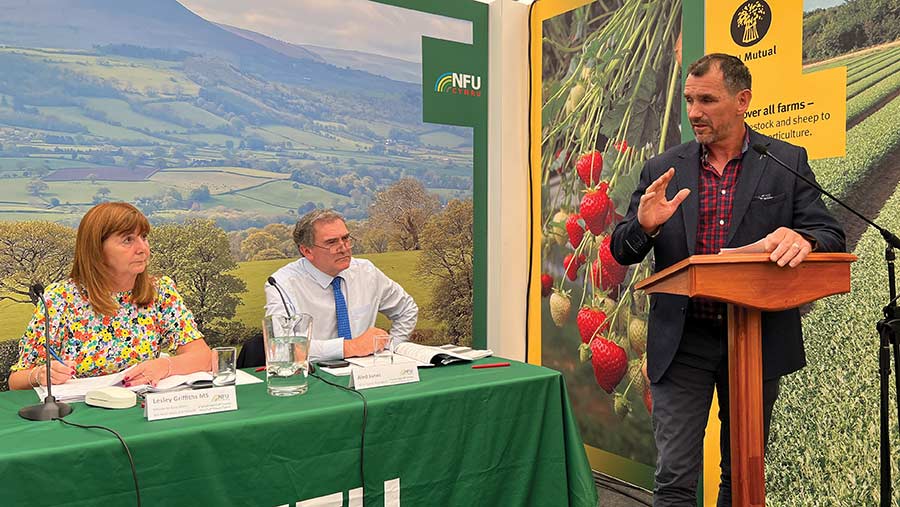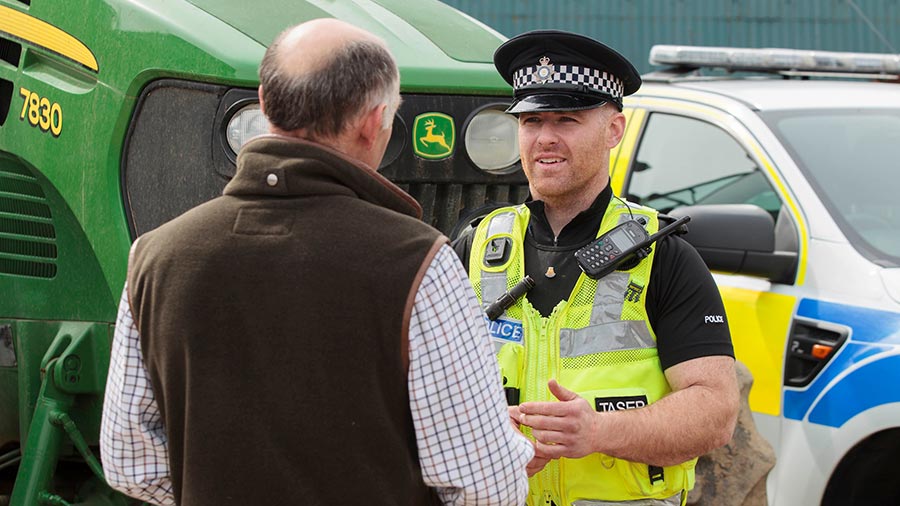2023: What made the farming news in July and August
Our review of 2023 in agricultural events continues with a look at July and August, when an early harvest (for some), the Sustainable Farming Incentive, farmworker deaths, anti-farming agendas, rural crime initiatives, bovine TB, beavers, excessive paperwork and staff shortages were all hot topics.
See also: Natural England told to change farmer engagement on Dartmoor
July
Catchy weather meant the 2023 harvest got off to a faltering start but for some winter barley growers who were combining at the start of the month it was their earliest ever harvest.
Not such good news for the winter wheat harvest though as rain delayed cutting until the end of July.
It wasn’t the weather that put a dampener on relations between farmers and the Welsh government at the Royal Welsh Show… it was trees.
NFU Cymru president Aled Jones and his deputy Abi Reader announced that they would boycott the proposed Sustainable Farming Scheme if the government didn’t row back on its requirement for farms to have 10% tree cover to be eligible to join.
Rural affairs minister Lesley Griffiths said she was “extremely disappointed”.

Lesley Griffiths, Aled Jones hear from upland sheep farmer Garry Williams © NFU Cymru
Carmarthenshire farmer Ian Rickman was elected as the new president of the Farmers’ Union of Wales.
Health and Safety Executive data showed there had been 21 recorded farmworker deaths in the UK over the past year.
Six members of the public were also fatally injured on farms, bringing the total to 27. Statistically, this made agriculture the most dangerous industry in the country.
An update to the 1972 Poisons Act was announced by the Home Office requiring farmers to provide photo ID from 1 October 2023 when they purchase ammonium nitrate (AN).
Fertiliser manufacturer CF Industries said it would close its ammonia production facility at Billingham in County Durham with the loss of 38 jobs, leaving the UK more reliant on imported ammonia to produce AN.
MPs called for a review of Natural England’s remit amid accusations of an “anti-farming agenda” after a series of controversial decisions, including a proposal to restrict livestock grazing on Dartmoor without consulting farmers.
Brad Tooze, director of greener farming at Natural England, acknowledged that “high-profile, difficult cases” had fed into negative feelings towards the agency.
MPs on the Environment, Food and Rural Affairs committee also called for a review of the protected status of beavers.
Excessive paperwork was blamed for keeping farmers in the office for more than 15 hours a week. A survey had shown that the most time-consuming tasks were linked to assurance scheme compliance.
There was more positive news from Hampshire County Council as it bucked the trend of authorities selling off council farms by signing five new tenancies.
And an eight-year-old Simmental-cross cow owned by Dorset farmer Philip Dean gave birth to triplet heifer calves, an event that happens just once in every 100,000 births.
A Colorado beetle was found in a field in Kent.
August
August saw a new weapon in the fight against rural crime, with the creation of the National Rural Crime Unit to share intelligence across UK police forces and overseas.
A new NFU Mutual report showed that the cost of rural crime to the industry had risen by £9m, to £45.9m, over the past 12 months.

© Tim Scrivener
Another new report, this time from the NFU, showed that almost one-third of dairy farmers were considering quitting the sector.
Insufficient returns, volatile markets and requirements for on-farm investment were cited as reasons.
In Wales, it was the pressure on farmers from bovine TB that hit the headlines.
A survey highlighted the financial and mental health toll the disease was having on dairy and beef producers.
Of the 101 farms with a breakdown at that time, 72 had been under restrictions for more than five years.
Pembrokeshire milk producer Steve Evans called on the Welsh government to introduce a targeted badger cull.
But the government responded by insisting there was “no evidence” that culling badgers would significantly help the country achieve its goal of TB eradication.
Animal disease outbreaks were listed on the UK government’s official risk register as among some of the most serious threats the country faced.
Diseases such as African swine fever, foot-and-mouth disease and avian influenza were listed as threats in the first update to the register in three years.
Funding worth £9m was given to 14 research projects to tackle endemic disease in the UK livestock sector, with recipients – including researchers – investigating the use of artificial intelligence for early detection of disease in dairy cattle and vaccines for bovine respiratory disease.
After a long period of losses, many pork producers saw a return to profit thanks to higher pig prices and falling costs of production.
But difficulties continued for meat processors with a warning of staff shortages in the food supply chain.
Chief executive of the British Meat Processors Association Nick Allen said high visa costs had made sourcing skilled workers from overseas increasingly difficult.
Meanwhile, farm businesses were urged not to fall foul of new government rules on employing illegal workers, with penalties increasing from £15,000 to £45,000 per illegal worker for a first-time breach.
